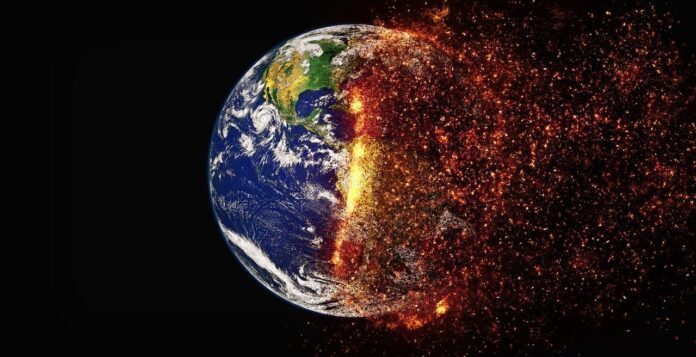Global warming is not a distant threat looming on the horizon; it is a clear and present danger that demands immediate attention. The term refers to the long-term heating of Earth’s climate system observed since the pre-industrial period (between 1850 and 1900) due to human activities, primarily fossil fuel burning, which increases heat-trapping greenhouse gas levels in Earth’s atmosphere. This phenomenon is causing widespread and severe consequences that are felt across the globe, from rising sea levels to extreme weather events. Understanding the gravity of global warming is the first step towards recognizing its potential to disrupt and endanger human survival.
The urgency to address global warming cannot be overstated. The Intergovernmental Panel on Climate Change (IPCC) has issued stark warnings about the consequences of inaction. The world is already experiencing the effects of a 1°C increase in average global temperature, and we are on a trajectory that could surpass a catastrophic 1.5°C increase as early as 2040. The time to act is now, as the window of opportunity to mitigate the worst outcomes is rapidly closing.
The Science Behind Global Warming: Causes and Consequences
At the core of global warming is the greenhouse effect, a natural process that warms the Earth’s surface. However, human activities, particularly the burning of fossil fuels like coal, oil, and gas, have amplified this effect by releasing excessive amounts of carbon dioxide (CO2) and other greenhouse gases into the atmosphere. Deforestation and industrial processes also contribute to the accumulation of these gases. The science is unequivocal: human activity is the dominant cause of the observed warming since the mid-20th century.
The consequences of this warming are far-reaching and multifaceted. Rising temperatures lead to the melting of ice caps and glaciers, contributing to rising sea levels that threaten coastal communities. The increased heat also exacerbates the intensity and frequency of extreme weather events such as hurricanes, heatwaves, and droughts. These events not only cause immediate harm to ecosystems and infrastructure but also have long-term implications for food security, water resources, and human health.
Immediate Impacts: How Global Warming is Affecting Us Now
Global warming is not a future predicament; its impacts are being felt in the present. Extreme weather events have become more common and more devastating. For instance, the 2021 North American heatwave shattered temperature records, causing hundreds of deaths and sparking wildfires. Similarly, the frequency of Category 4 and 5 hurricanes has increased due to warmer ocean temperatures, leading to more destructive storms like Hurricane Maria, which devastated Puerto Rico in 2017.
Moreover, global warming is affecting biodiversity, with species struggling to adapt to rapidly changing conditions. Coral reefs, which are vital to marine life, are experiencing bleaching events at an alarming rate due to warmer ocean temperatures. On land, the changing climate is altering habitats and forcing species to migrate, which can lead to conflicts with human populations and agricultural activities. These immediate impacts are just a glimpse of the disruptions that global warming is causing to our planet’s delicate balance.
Future Forecasts: Projected Risks of Unchecked Global Warming
If global warming continues unchecked, the future risks are dire. The IPCC projects that a global temperature rise of 2°C could result in widespread and severe impacts on natural systems and human society. For example, sea levels could rise by nearly a meter by the year 2100, displacing millions of people from coastal areas. Additionally, a warmer climate is expected to exacerbate food and water scarcity, particularly in vulnerable regions, leading to increased conflict and migration.
The health of the global population is also at stake. Heat-related illnesses and diseases carried by insects, like malaria and dengue fever, are expected to increase in prevalence and geographic range. The economic costs of these changes are staggering, with estimates suggesting that global warming could cost the world economy trillions of dollars by the end of the century. The future forecasts paint a grim picture, but they also serve as a call to action to prevent the worst outcomes.
Mitigation and Adaptation: Strategies to Combat Global Warming
Combating global warming requires a two-pronged approach: mitigation and adaptation. Mitigation involves reducing the flow of greenhouse gases into the atmosphere by transitioning to renewable energy sources, improving energy efficiency, and protecting and restoring forests. For instance, the Paris Agreement, adopted by nearly every nation in 2015, aims to limit global warming to well below 2°C above pre-industrial levels. This international commitment is a crucial step towards global mitigation efforts.
Adaptation, on the other hand, involves making adjustments in our ecological, social, and economic systems in response to actual or expected climatic stimuli. This includes building resilient infrastructure, developing drought-resistant crops, and implementing early warning systems for extreme weather events. While adaptation does not stop global warming, it can help reduce the vulnerability of communities and ecosystems to its effects.
Mobilizing for a Sustainable Future
The fight against global warming is a collective endeavor that requires action from all sectors of society. Governments must lead with ambitious policies and investments in sustainable technologies and infrastructure. Businesses can innovate and drive the transition to a low-carbon economy, while individuals can make lifestyle changes, such as reducing energy consumption and supporting sustainable products and practices. Mobilizing for a sustainable future also means engaging in civic processes, advocating for strong climate policies, and holding leaders accountable.
Global warming is an existential threat that requires immediate and decisive action. By understanding the science, recognizing the immediate impacts, preparing for future risks, and implementing strategies for mitigation and adaptation, we can confront this clear and present danger. It is time for a concerted global effort to mobilize for a sustainable future and safeguard human survival on this planet.
